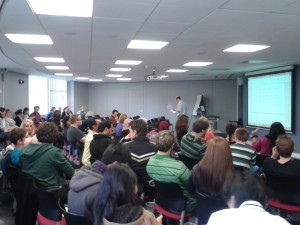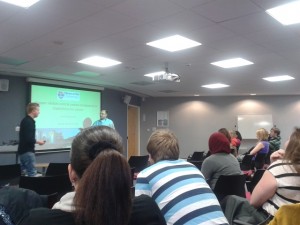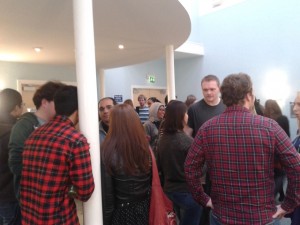by Dr Tim Cheek
Every year, we give our 2nd year Phd students to present their research in a relaxed, informal setting to their peer group and to the incoming 1st year students. The purpose of the event is two-fold:
– provide 2nd year students with a new presentation skill of giving a research talk to an informed but non-expert audience
– give 1st year students an illustration of the diversity of the science that is done in ICaMB and an idea of where their own research should be in one year’s time when it will be their turn to speak.
This year’s talks on eukaryotic biology ranged from whole organism mammalian physiology (“The effect of neuromodulatory medication on the oral mucosa”, Mustafa Al-Musawi, Jakubovics lab) to single cell yeast genetics (“The role of the CST complex in telomere integrity, Kate Clark, Lydall lab)].
A key aim of basic bioscience research carried out in ICaMB is that it underpins our understanding of the molecular basis of disease and disorder and informs future translational biomedical approaches. This aim was strongly evident with talks on mitochondrial translational defects in encephalomyopathy (Maria Wesolowska, Lightowlers lab), the molecular basis of disease caused by non-invasive enteric pathogens (Oli Amin, Kenny lab), the role of the oxidative stress response in mediating fungal infections (Melanie Ikeh, Quinn lab), the molecular basis of “ribosomopathies”- human disorders of ribosome dysfunction (Loren Macdonald, Watkins lab), the effects of Resveratrol (Suzanne Escome, Ford lab) and DNA methylation (Joy Hardyman, Ford lab) on age-related genes, and on the role of membrane transport proteins in renal stone disease (Sarah Rice, Thwaites lab). The theme was extended with talks on how dysfunction in metal ion homeostasis in cells plays a key role in disease and disorder, for example calcium signals in neuroblastoma (Claire Whitworth, Cheek lab) and copper in Alzheimer’s disease (Eliona Tsefou, Dennison lab). Copper metabolism in lower eukaryotes was discussed in a talk on copper trafficking in yeast (Kerrie Brusby, Dennison lab) and in prokaryotes by talks on copper binding sites in Bacillus subtilis (Gianpiero Landolfi, Dennison lab) and Staphylococcus aureus (Jack Stevenson, Waldron lab).
The evolution of eukaryotic cells, their genomes and organelles, is also of great interest to ICaMB researchers who collaborate with, among others, the Natural History Museum in London. One talk described the development of better methods, based upon likelihood and Bayesian approaches, for phylogenetic analysis of molecular data (Svetlana Cherlin, Embley lab). The aim is to improve the reconstruction of phylogenetic trees relevant to understanding the early evolution of eukaryotes and the origins of eukaryotic genes.
Another illustration of the diversity of ICaMB research is that laboratories are also engaged in the development of new technological strategies for biomedical research. This was demonstrated by talks on the development of a primary tissue culture model system that can be used to identify the renal toxicity of new therapeutic drugs (Sarah Billington, Colin Brown lab), a simplified detection process for aggregation in the manufacture of biotherapeutics (Alysia Davies, Lakey lab), and on the use of natural antisense transcripts that may lead to improved gene silencing strategies in clinical applications (Monica Piatek, Werner lab).
The Centre for Bacterial Cell Biology in ICaMB is at the forefront of research into fundamental aspects of the cell biology and biochemistry of bacteria. Research provides scientific insights crucial for the discovery and development of new antibiotics, as well as providing solutions to a huge range of industrial and environmental problems through the emerging discipline of synthetic biology. This focus was reflected by talks on bacterial cell wall peptidoglycans (Adam Lodge, Vollmer lab) and D-alanine (Karzan Sidiq, Daniel lab), on system noise in the transcription of negatively regulated bacterial genes (Thomas Ewen, Hamoen lab), on the bacteriocin colicin (Daria Stroukova, Lakey lab), on cell wall deficient bacteria (L-forms; James Brown, Errington lab) and on the role of dental plaque bacteria in biofilm formation (Jill Robinson, Jakubovics lab). The theme was advanced with two talks on complex glycan recognition, acquisition and degradation by human gut bacteria (Sarah Shapiro, Bolam lab; Max Temple, Gilbert lab). Results of this research have applications in a number of areas including the development of biofuels derived from plant cell wall material and in personalised nutrition approaches to optimise microbiota function for the benefit of human health.
This opportunity to talk about science and to engage with peers in a semi-formal environment, with no academic staff, is invariably voted by 1st and 2nd year students as their most favoured ICaMB event of the year. This year was no different. With 26 speakers and around 50 attendees in each of the 4 sessions, ICaMB students are clearly voting with their feet!
Dr Tim Cheek is the ICaMB Postgraduate Tutor.
If you are interested in applying for a PhD studentship in ICaMB more details can be found at http://www.ncl.ac.uk/camb/study/postgraduate/index.htm
Links
PANIC: the postgraduate network of ICaMB http://www.societies.ncl.ac.uk/panicicamb/index.html
Postgraduate Opportunities at ICaMB http://www.ncl.ac.uk/camb/study/postgraduate/index.htm




